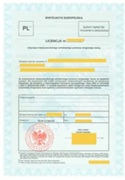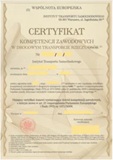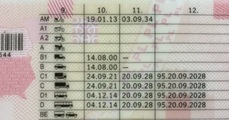Comprehensive Guide to Starting a Transport Company in Poland
 Poland’s central location in Europe, rapidly growing economy, and modern transport infrastructure make it a strategic choice for establishing a transport company. Whether you aim to focus on domestic logistics or international freight, starting a transport business in Poland requires careful planning and compliance with national and EU regulations. This article provides a detailed roadmap for launching and operating a transport company in Poland, covering legal, financial, and operational requirements.
Poland’s central location in Europe, rapidly growing economy, and modern transport infrastructure make it a strategic choice for establishing a transport company. Whether you aim to focus on domestic logistics or international freight, starting a transport business in Poland requires careful planning and compliance with national and EU regulations. This article provides a detailed roadmap for launching and operating a transport company in Poland, covering legal, financial, and operational requirements.
Business Registration: Choosing a Legal Form
Selecting the right legal form is a crucial first step. Options in Poland include:
- Sole Proprietorship (Jednoosobowa Działalność Gospodarcza):
- Ideal for small-scale businesses, with straightforward registration but unlimited personal liability. Co musisz wiedzieć zanim zarejestrujesz firmę
- Limited Liability Company (Spółka z o.o.):
- Popular for medium and large businesses, requiring a minimum share capital of 5,000 PLN. Spółka z ograniczoną odpowiedzialnością
- General or Limited Partnership (Spółka Jawna, Spółka Komandytowa):
- Suitable for businesses with multiple partners. Spółka jawna – podstawowe informacje
- Joint-Stock Company (Spółka Akcyjna):
- Designed for large enterprises, requiring substantial capital and complex management. Spółka akcyjna
Business Registration Process
- Central Register or National Court Register:
-
 Sole proprietors register with the CEIDG (Central Registration and Information on Business). Companies register with the National Court Register (KRS). Krajowy Rejestr Sądowy
Sole proprietors register with the CEIDG (Central Registration and Information on Business). Companies register with the National Court Register (KRS). Krajowy Rejestr Sądowy
- Obtain a Tax Identification Number (NIP):
-
 Register with the Polish Tax Office to obtain your NIP for VAT and corporate tax. Zarejestruj się jako podatnik VAT
Register with the Polish Tax Office to obtain your NIP for VAT and corporate tax. Zarejestruj się jako podatnik VAT
- Register with ZUS (Social Insurance Institution):
-
 Register yourself and any employees for social security and health insurance. Jak zarejestrować się w ZUS i zgłosić do ubezpieczeń
Register yourself and any employees for social security and health insurance. Jak zarejestrować się w ZUS i zgłosić do ubezpieczeń
- REGON Number:
-
 Obtain this statistical identification number from the Central Statistical Office (GUS). Uzyskaj numer REGON dla jednostki lokalnej
Obtain this statistical identification number from the Central Statistical Office (GUS). Uzyskaj numer REGON dla jednostki lokalnej
Licensing and Permits: Transport License Requirements
 Operating a transport business in Poland requires appropriate licensing:
Operating a transport business in Poland requires appropriate licensing:
- National Transport License:
- For companies operating solely within Poland.
- EU Community License:
- For businesses engaged in cross-border transport within the EU. Uzyskaj zezwolenie na wykonywanie zawodu przewoźnika drogowego
Transport Licensing Conditions

- Proof of Professional Competence:
- The transport manager must hold a Certificate of Professional Competence (CPC). Uzyskanie certyfikatu kompetencji zawodowych w drogowym transporcie
- Financial Standing:
- Demonstrate sufficient funds to cover operational costs: €9,000 for the first vehicle. €5,000 for each additional vehicle.
- Good Repute:
- Provide evidence of a clean criminal and financial record for management and key personnel.
Vehicle Registration and Compliance
- Vehicle Registration
- All commercial vehicles must be registered with the Polish Department of Communication (Wydział Komunikacji). Documentation required includes: Vehicle purchase agreement or invoice. Proof of insurance. Technical inspection certificate. Rejestracja pojazdów
- Technical Inspections
- Vehicles must pass periodic inspections to ensure roadworthiness. Commercial vehicles are subject to stricter technical and environmental standards. Stacji Kontroli Pojazdów
Insurance Requirements
- Mandatory Insurance
- Civil Liability Insurance: Covers damages to third parties. Vehicle Insurance: Protects against accidents involving company vehicles. Cargo Insurance: Ensures goods are protected during transit.
- Optional Insurance
- Business Liability Insurance: Safeguards against operational risks. Employer Liability Insurance: Required if you have employees.
Employment and Labor Regulations
- Hiring Drivers
-
 Drivers must hold a valid Category C or CE license for heavy goods vehicles. Completion of Driver Certificate of Professional Competence (CPC) training is mandatory. Co to jest Kod 95 prawa jazdy
Drivers must hold a valid Category C or CE license for heavy goods vehicles. Completion of Driver Certificate of Professional Competence (CPC) training is mandatory. Co to jest Kod 95 prawa jazdy
- Labor Compliance
- Register employees with ZUS (Social Insurance Institution) for social and health insurance. Ensure compliance with Polish labor laws on wages, working hours, and employment contracts. Zakład Ubezpieczeń Społecznych
- Driving Hours and Rest Periods
- Adhere to EU Regulation (EC) No 561/2006 for driving and rest times. Equip vehicles with tachographs to monitor compliance. Driving time and rest periods in the road transport sector
Taxation and Financial Obligations
- Corporate Taxes
- Corporate tax in Poland is 19%, with a reduced rate of 9% for small companies. VAT (Value Added Tax) is set at a standard rate of 23%, with reduced rates for specific goods and services.
- Road Taxes and Tolls
-
 Heavy Goods Vehicles (HGVs) are subject to the viaTOLL system, calculated based on distance traveled, vehicle weight, and emissions. Tolls apply to highways and major roads. System e-TOLL
Heavy Goods Vehicles (HGVs) are subject to the viaTOLL system, calculated based on distance traveled, vehicle weight, and emissions. Tolls apply to highways and major roads. System e-TOLL
Environmental Obligations
- Low-Emission Zones (LEZs)
- Major cities like Warsaw and Kraków enforce low-emission zones that restrict access for older, polluting vehicles. Strefa czystego transportu w Polsce
- Green Incentives
- The Polish government offers subsidies for companies adopting eco-friendly vehicles and practices, such as electric or hybrid trucks.
Operational Standards and Safety
- Cargo Safety
- Adhere to EU standards for cargo securing to prevent accidents. Ensure vehicles carry mandatory safety equipment like fire extinguishers and reflective signs.
- Workplace Safety
- Implement training programs for drivers and logistics staff. Establish protocols for loading and unloading operations.
- Record Keeping
- Maintain accurate records of vehicle maintenance, driver activities, and financial transactions for inspections.
Inspections and Penalties
- Regulatory Inspections
- Polish authorities conduct regular checks to ensure compliance with transport regulations.
- Penalties for Non-Compliance
- Violations, such as overloading vehicles or breaching driving hours, can result in fines, license suspensions, or legal actions.
Conclusion
Launching a transport company in Poland offers significant opportunities in a growing market, but it requires meticulous planning and strict adherence to regulations. From business registration and licensing to vehicle compliance and labor laws, every step is critical for success. By leveraging innovative tools and embracing sustainability, your transport business can thrive in Poland’s dynamic logistics sector.
eXus Dev